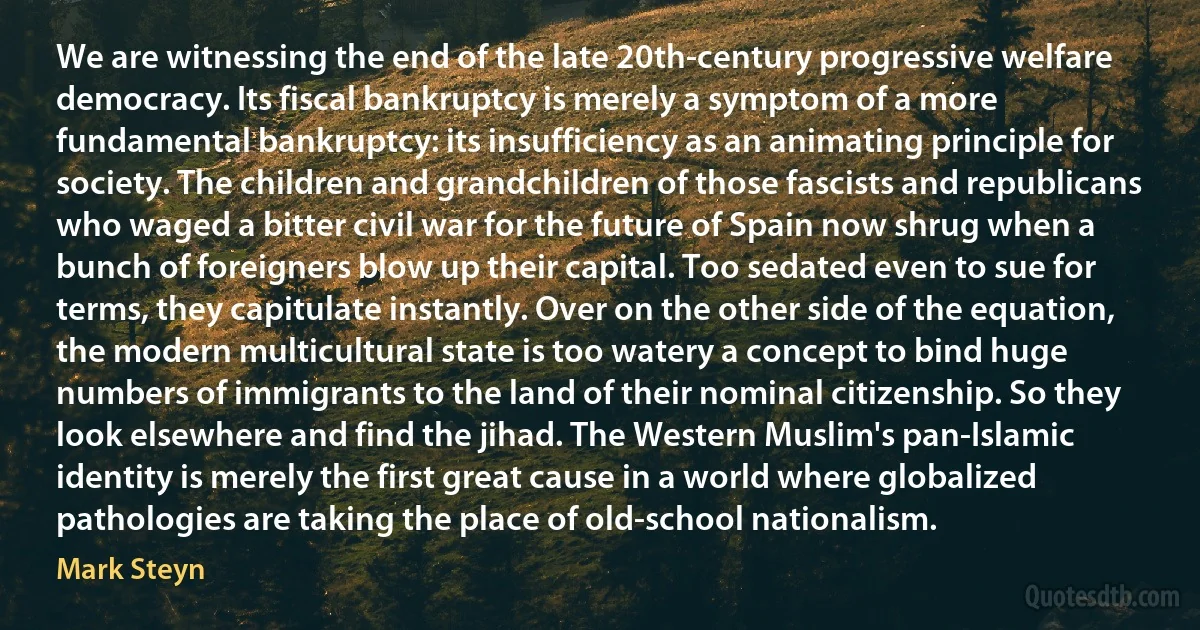
We are witnessing the end of the late 20th-century progressive welfare democracy. Its fiscal bankruptcy is merely a symptom of a more fundamental bankruptcy: its insufficiency as an animating principle for society. The children and grandchildren of those fascists and republicans who waged a bitter civil war for the future of Spain now shrug when a bunch of foreigners blow up their capital. Too sedated even to sue for terms, they capitulate instantly. Over on the other side of the equation, the modern multicultural state is too watery a concept to bind huge numbers of immigrants to the land of their nominal citizenship. So they look elsewhere and find the jihad. The Western Muslim's pan-Islamic identity is merely the first great cause in a world where globalized pathologies are taking the place of old-school nationalism.
Mark SteynRelated topics
bankruptcy bind bitter blow capitulate cause children citizenship concept elsewhere end equation find fiscal fundamental future great insufficiency land late nationalism nominal now place progressive shrug side state taking war western witnessing world jihad old-schoolRelated quotes
On the 26th of January 1950, we are going to enter into a life of contradictions. In politics we will have equality and in social and economic life we will have inequality. In politics we will be recognizing the principle of one man one vote and one vote one value. In our social and economic life, we shall, by reason of our social and economic structure, continue to deny the principle of one man one value. How long shall we continue to live this life of contradictions? How long shall we continue to deny equality in our social and economic life? If we continue to deny it for long, we will do so only by putting our political democracy in peril. We must remove this contradiction at the earliest possible moment or else those who suffer from inequality will blow up the structure of political democracy which is Assembly has to laboriously built up.”.

Bhimrao Ramji Ambedkar
Aside from the equation it draws between making money and being good, the modern ideal of a successful life posits a further linkage between making money and being happy. This latter association rests on ... assumptions. First, it is presumed that identifying what will make us happy is not an inordinately difficult task. Just as our bodies typically know what they need in order to be healthy... so, too, the theory goes, can our minds to be relied upon to understand what we should aim for so as to flourish as whole human beings. ... Second, it is taken for granted that the enormous range of ... consumer goods available to modern civilization is not merely a gaudy, enervating show responsible for stoking desires bearing little relevance to our welfare, but is, rather, a helpful array of potentialities and products, capable of satisfying some of our most important needs.

Alain de Botton
THEY who are acquainted with the present state of the theory of Symbolical Algebra, are aware, that the validity of the processes of analysis does not depend upon the interpretation of the symbols which are employed, but solely upon the laws of their combination. Every system of interpretation which does not affect the truth of the relations supposed, is equally admissible, and it is thus that the same process may, under one scheme of interpretation, represent the solution of a question on the properties of numbers, under another, that of a geometrical problem, and under a third, that of a problem of dynamics or optics. This principle is indeed of fundamental importance; and it may with safety be affirmed, that the recent advances of pure analysis have been much assisted by the influence which it has exerted in directing the current of investigation.

George Boole
But, as we consider the totality of similarly broad and fundamental aspects of life, we cannot defend division by two as a natural principle of objective order. Indeed, the "stuff” of the universe often strikes our senses as complex and shaded continua, admittedly with faster and slower moments, and bigger and smaller steps, along the way. Nature does not dictate dualities, trinities, quarterings, or any "objective” basis for human taxonomies; most of our chosen schemes, and our designated numbers of categories, record human choices from a cornucopia of possibilities offered by natural variation from place to place, and permitted by the flexibility of our mental capacities. How many seasons (if we wish to divide by seasons at all) does a year contain? How many stages shall we recognize in a human life?

Stephen Jay Gould
For what advantage is it, that the world enjoys profound peace, if thou art at war with thyself? This then is the peace we should keep. If we have it, nothing from without will be able to harm us. And to this end the public peace contributes no little: whence it is said, ‘That we may lead a quiet and peaceable life.' But if any one is disturbed when there is quiet, he is a miserable creature. Seest thou that He speaks of this peace which I call the third (inner, ed.) kind? Therefore when he has said, ‘that we may lead a quiet and peaceable life,' he does not stop there, but adds ‘in all godliness and honesty.' But we cannot live in godliness and honesty, unless that peace be established. For when curious reasonings disturb our faith, what peace is there? or when spirits of uncleanness, what peace is there?

John Chrysostom
